In the bustling world of technology, the Power Supply Unit (PSU) is often overshadowed by other flashy components like CPUs and GPUs. Yet, it is the backbone of a desktop PC, ensuring that every part receives the energy it needs to operate efficiently. Whether you're a gamer, a creative professional, or a regular user in Bangladesh, understanding how to choose the right PC PSU is crucial for building a reliable and efficient system. This guide will provide detailed insights into selecting the perfect power supply for your desktop.
What is a Computer Power Supply?
At its core, a desktop computer power supply is a device that converts the alternating current (AC) from your wall outlet into the direct current (DC) that the internal components of your PC require. This transformation is vital as computer components are designed to run on DC. Beyond mere power conversion, a Power Supply also regulates voltage to ensure that each component receives consistent and stable power, which is essential for the longevity and performance of your system.
The Power Behind Performance: Mastering Power Supply Choices
Choosing a PSU starts with understanding the power demands of your system. A Power Supply Unit range of 450W to 550W is often sufficient for general use. For instance, the Gigabyte P550B 550W 80 Plus Bronze Certified Non-Modular Power Supply is a great choice for most desktops handling everyday tasks like browsing, streaming, lite gaming, and office applications. However, if you're seeking into gaming or creative fields like video editing or 3D rendering, a more robust PC Power Supply like the Cooler Master GX2 750W 80 Plus Gold Fully-Modular ATX Power Supply is recommended. This ensures your system can handle high-performance graphics cards and processors, delivering the power needed for demanding applications.
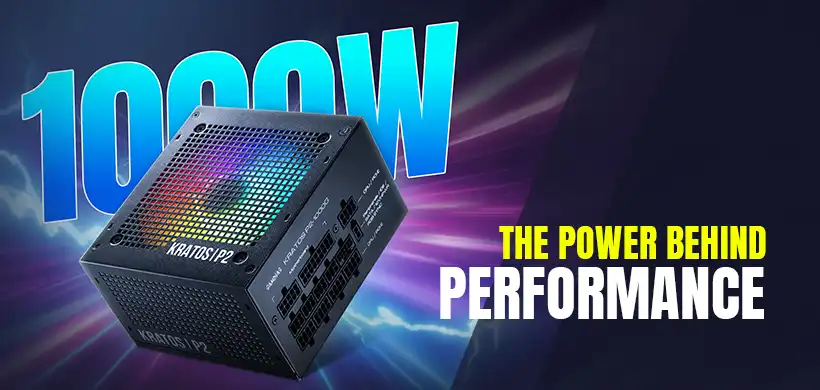
How Do I Choose a Power Supply for My Desktop?
Selecting a desktop Power Supply Unit (PSU) involves several key factors. First, assess your current system's power requirements and potential future upgrades. This is where tools like a power supply calculator come into play, allowing you to estimate the total wattage needed. As a blessing, the Star Tech PC builder service on the Star Tech website made this job easier for PC enthusiasts. On the Star Tech PC Builder page, you just need to add the computer components you wish to your desktop build. The PC builder will automatically calculate and show you the total power in Wattage you are going to need.
Compatibility with your PC case and motherboard is another critical consideration, as is the PSU's efficiency rating, which impacts energy consumption and heat output. Opt for a PSU that not only meets your immediate needs but also provides a buffer for future hardware additions. You must go through the detailed Star Tech PC Builder blog which will assist you in properly utilizing the Star Tech PC Builder service.
Identifying The Total PSU Wattage Required
Calculating the required wattage is perhaps the most critical step in selecting a PSU. Every component in your system, especially the CPU and GPU, contributes to the total power consumption. By using a power supply calculator, you can accurately determine if a Power Supply 550W is sufficient for your current setup. A good rule of thumb is to select a PSU that offers at least 20% more wattage than your current needs. This ensures that your PSU operates within its optimal efficiency range and can accommodate future upgrades without stress.
Additional Power Supply Unit Wattage for Future Upgrades
As technology evolves, so do the power requirements of new components. While a 500W power supply might suffice for today's needs, future expansions like a more powerful GPU or additional storage might require more power. Investing in a PSU with a higher capacity, such as a 650W or 750W model, ensures that your system remains adaptable to technological updates. This foresight not only future-proofs your setup but also enhances system stability and performance as you scale your hardware capabilities.
Power Supply Unit Form Factor
The form factor of your PSU must match your PC case to ensure a proper fit and optimal cooling performance. Here's a detailed look at the common Power Supply Unit form factors:
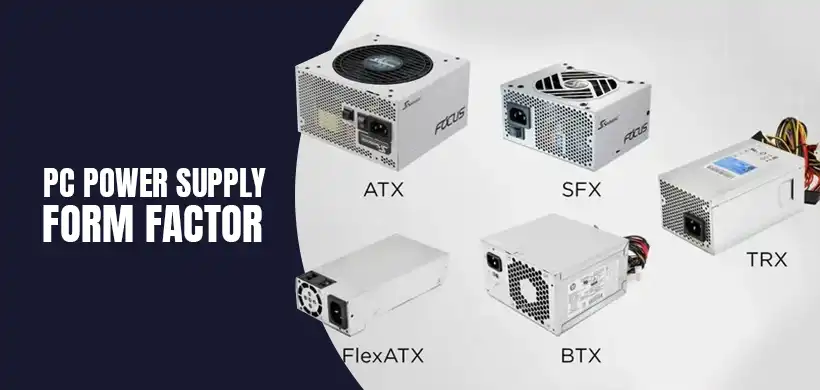
ATX (Advanced Technology Extended) PSU
This is the standard PSU form factor for most desktops. It supports a wide range of power capacities and fits most case sizes, making it versatile and popular. An ATX PSU is ideal for both regular desktops and gaming builds, offering flexibility and reliability.
SFX (Small Form Factor Extended) PSU
Designed for compact builds, SFX Power Supply Units are perfect for mini-ITX cases and small-scale setups where space is at a premium. Despite their smaller size, SFX PSUs can deliver significant power, making them suitable for high-performance compact systems.
TFX (Thin Form Factor Extended) PSU
TFX power supplies are designed for slim PC cases, making them longer and narrower than standard ATX units. They are ideal for low-profile systems that require adequate power without the bulk of larger PSUs. TFX PC Power Supply Units are perfect for office environments or media centers where space and noise levels are a concern.
Consider Desktop PSU Peripherals (Connectors)
When choosing a PSU, ensure it has the necessary connectors to support your components. Here are the key connectors to consider:
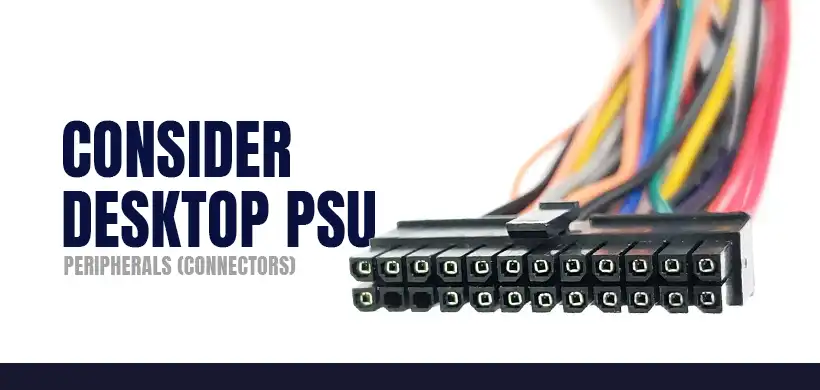
24-pin Motherboard Power Connector: This is the primary power connector for the mobo, providing the necessary power by PSU for basic functions.
4/8-pin CPU Power Connector: This PSU connector supplies power directly to the CPU, ensuring stable performance, especially under heavy loads.
SATA Power Connectors: These PSU connectors provide power to SSDs, HDDs, and optical drives, supporting data storage and retrieval tasks.
4-pin Molex Power Connectors: Although less common in modern builds, these PSU Molex connectors are still useful for certain peripherals and older hardware configurations.
6/8 pin PCIe GPU Connector: Essential for powering graphics cards, these Power Supply connectors support high-performance GPUs used in gaming and creative workstations.
Power Supply Types Influencing Desktop Look
The type of PSU you choose can significantly impact cable management and airflow within your case. Here are the main types of PSUs:
Non-Modular PSU For Desktop PCs
These Power Supply Units come with a fixed set of cables attached, which can create clutter within the case and impede airflow. They are typically more budget-friendly, as seen in models like the Antec META V350 350W Power Supply 80 Plus Non-Modular.
Semi-Modular PSU For Desktop PCs
Offering a middle ground, semi-modular PSUs allow some cables to be detached, providing more flexibility in cable management and improving airflow. Some cables in a semi-modular power supply are hardwired, such as the ATX 24-pin and 4/8-pin ATX cables.
Full-Modular PSU For Desktop PCs
With all cables detachable, fully modular Power Supply Units allow for the cleanest and most efficient cable management. This is ideal for custom builds where aesthetics and airflow are priorities, such as the Corsair HX1500i 1500W 80+ Platinum Full-Modular ATX Power Supply.
Choose Among The Leading PC PSU Brands
Opting for a desktop Power Supply from a reputable brand ensures reliability and performance. Here are some top brands to consider:
Corsair: Known for high-quality and performance-oriented PSUs, Corsair offers models like the Corsair HX1500i 1500W, which are perfect for high-end builds.
Antec: A trusted name in the industry, Antec provides a range of reliable Power Supply Units suitable for various budgets.
Thermaltake: Known for innovative designs and solid performance, Thermaltake offers PSU models like the Thermaltake SMART BM2 750W Semi Modular 80 Plus Bronze Power Supply.
FSP: Providing budget-friendly yet reliable power supplies, FSP is ideal for cost-conscious users who do not want to compromise on quality.
Gigabyte: Gigabyte offers efficient and well-built power supplies, such as the Gigabyte P550B 550W, which is known for balancing performance and affordability.
Budget Always Impacts Our Choices
Balancing performance and cost is crucial when selecting a PSU. Use a power supply calculator to evaluate your needs and find a unit within your budget that meets your requirements. Spending slightly more for higher efficiency and better protection features can ensure long-term value and reliability.
Asking Yourself, How Do I Know Which Power Supply is Best?
To figure out the best Power Supply for your setup that will align with your power needs, case compatibility, and future upgrade plans. Research is key; consider options like the DeepCool PN650D 650W 80 Plus Gold Non-modular Power Supply for excellent reliability. Reviews and recommendations from trusted sources can guide your decision, ensuring you choose a unit that delivers consistent performance.
Power Supply Efficiency Rating
Efficiency is a critical factor of Power Supply that impacts both performance and energy consumption. Higher efficiency results in less wasted electricity, translating to lower utility bills and reduced heat output. Common efficiency ratings include:
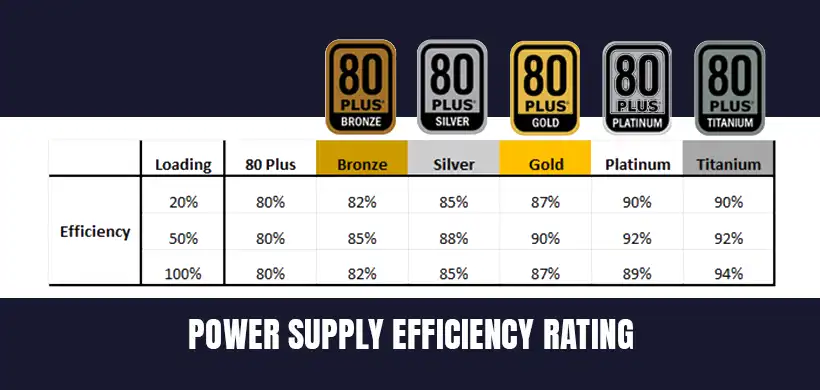
80 PLUS White Rated PSU: The basic standard for efficiency, ensuring at least 80% energy efficiency at 20%, 50%, and 100% loads.
80 PLUS Bronze Rated PSU: Offers a good balance of efficiency and cost, found in PSU models like the FSP Hydro K PRO 500W 80 Plus Bronze Power Supply Non-Modular.
80 PLUS Silver Rated PSU: Slightly more efficient than Bronze, suitable for moderate setups focused on energy savings.
80 PLUS Gold Rated PSU: Optimal for power savings and performance, providing 87% Power Supply Unit efficiency at full load, as seen in the Cooler Master GX2 750W.
80 PLUS Titanium Rated PSU: The pinnacle of efficiency, ideal for creators needing consistent performance with 90% efficiency even at low loads. Offers high efficiency for demanding users, ensuring minimal power loss and effective energy use.
Protection Features: The Ultimate Sheild of a Power Supply
Power Supply Units come equipped with various protection features to safeguard your components from electrical hazards:
Over Current Protection (OCP): Prevents excessive current from damaging components from the end of the Power Supply.
Over Voltage Protection (OVP): Guards against voltage spikes that can cause damage to the PC components.
Short Circuit Protection (SCP): Power Supply equipped with this feature shield against electrical shorts, protecting your system from potential failure.
Over Temperature Protection (OTP): Protects against overheating, ensuring your components remain within safe operating temperatures.
Over Power Protection (OPP): Prevents the Power Supply from delivering computer power beyond its rated capacity, avoiding overloads.
Under Voltage Protection (UVP): This Power Supply feature can prevent voltage dips that can destabilize the system, ensuring consistent power delivery.
Surge and Inrush Protection (SIP): Defends your desktop against sudden voltage spikes and surges from the end of Power Supply Units, maintaining stable power delivery.
Wattage Wisdom: The Right Power Supply for Every Computing Need
When considering power capacities, it's crucial to align your choices with your computer usage patterns.
Recommended PSU Power Capacity for Regular Desktop PC Users
For regular, everyday computing tasks such as web browsing, document editing, and media consumption, a Power Supply with a capacity of 350W to 450W is typically sufficient. This range provides ample power for a basic setup without overspending on unused capacity. Models like the Antec META V350 350W Power Supply 80 Plus Non-Modular are suitable for such purposes, offering a balance of efficiency and affordability.
Recommended PSU Power Capacity for Productive Desktop PC Users
For more productive tasks that may involve photo editing, light video work, or running multiple applications simultaneously, a Power Supply in the 500W to 650W range is recommended. This capacity supports more powerful CPUs and additional RAM, ensuring that your system can handle increased workloads without straining the power supply. The FSP Hydro K PRO 500W 80 Plus Bronze Power Supply Non-Modular is a good choice for users looking to balance performance and cost.
Recommended PSU Power Capacity for Gaming Desktop PC Users
Gaming enthusiasts, who require ever-ready systems capable of supporting high-performance graphics cards and CPUs, should consider power supplies in the 750W and above category. This ensures that your gaming PC can maintain stability and performance during intense gaming sessions, particularly with modern AAA title games that demand significant power. The Thermaltake SMART BM2 750W Semi Modular 80 Plus Bronze Power Supply is an excellent option, providing reliable power delivery and modularity for a clean build.
Energize Your Build: Final Thoughts on PSU Selection
Choosing the right Power Supply is a pivotal decision that can seriously affect your PC's performance and reliability. By carefully assessing your current and future power needs, understanding the importance of PSU efficiency, and selecting the appropriate form factor and features, you can ensure that your system operates smoothly and efficiently. Whether you are a regular user, a creative professional, or a gaming enthusiast, this guide should help you navigate the complexities of selecting the perfect power supply for your needs.
For those in Bangladesh, exploring local retailers like Star Tech computer shops and online platforms can provide insights into the latest PSU models and their prices, helping you find the best deals. Investing in a quality power supply not only enhances your computing experience but also ensures the longevity of your components, making it a crucial element of any PC build. Visit your Star Tech physical store or online shop today to explore the options and build your dream computer with the best Power Supply with the help of Star Tech PC builder.

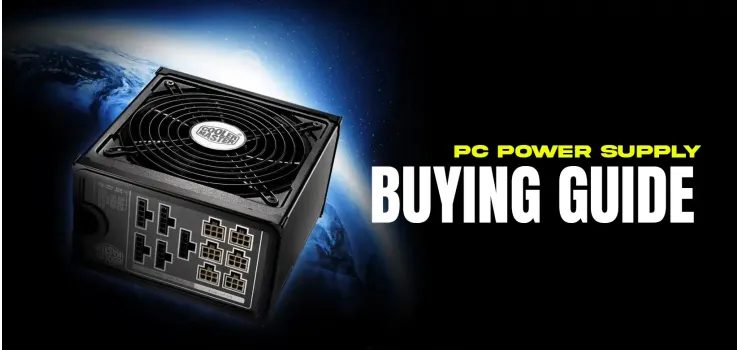








Comments
There are no comments for this Article.